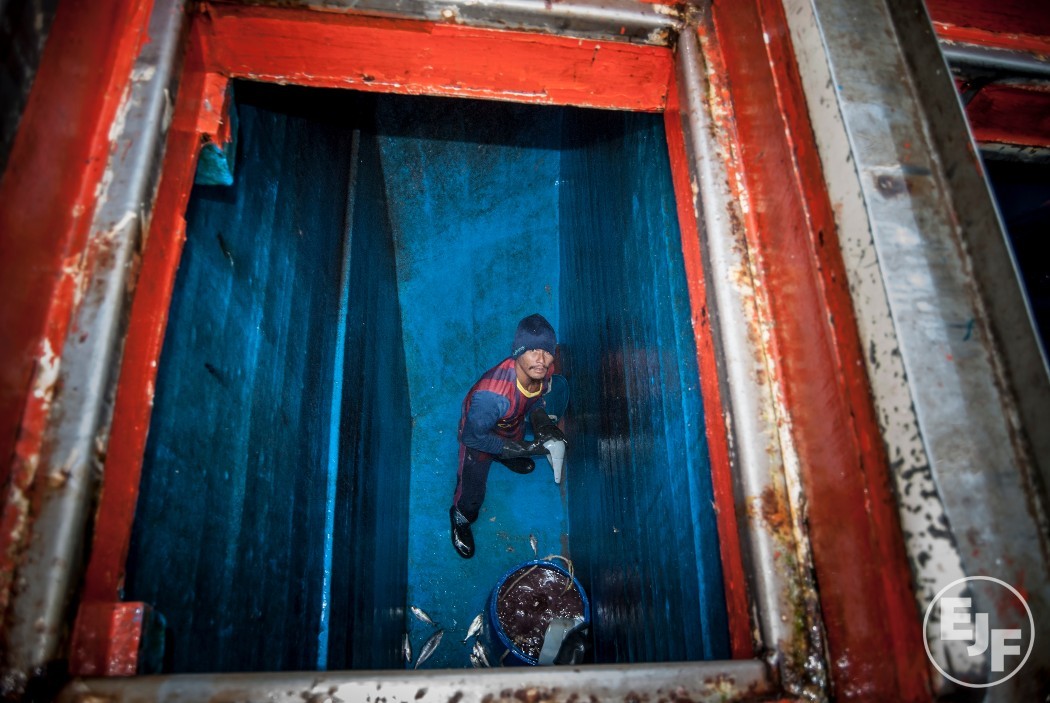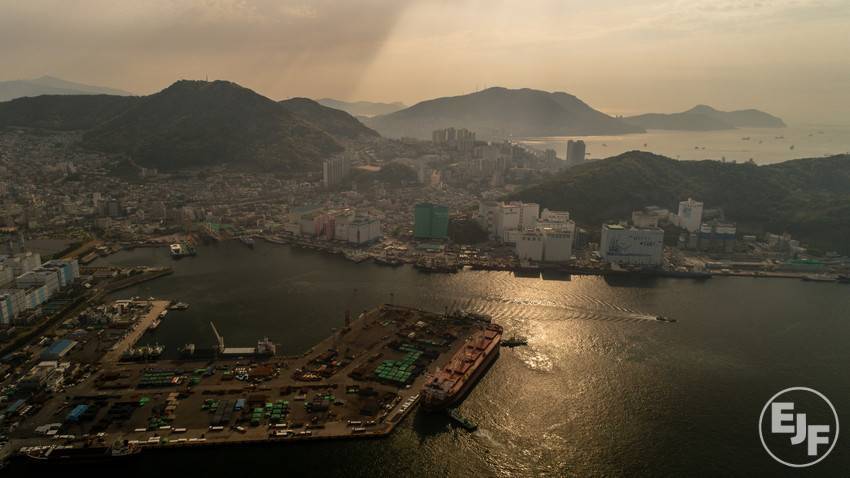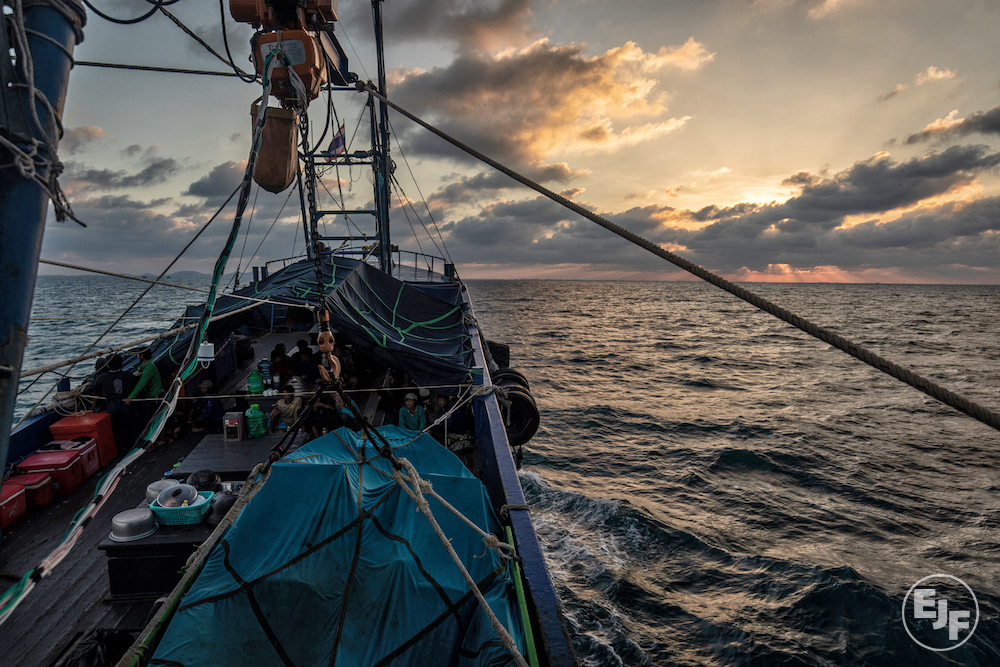
Full scale of human rights abuse in the fishing industry revealed
A new report by the Environmental Justice Foundation (EJF) details cases of slavery, debt bondage, insufficient food and water, filthy living conditions, physical and sexual assault and even murder aboard fishing vessels from 13 countries operating across three oceans. Urgent ratification of international agreements designed to improve workers’ rights, inspections and enforcement is needed, the report says. Full transparency in the industry is also crucial to ending the cycle of abuse.
Evidence from recent investigations by EJF, other NGOs and the media are brought together in the report to reveal the true extent of abuses in the fishing industry.
The report details numerous cases of abuse, on vessels flying the flags of both developing and developed nations, from the EU and USA to Asia and South America. It includes recent investigations revealing serious abuses on vessels ranging from Taiwanese long-liners fishing far out at sea for high-value tuna, to desperate Vietnamese trawlers illegally entering Thai coastal waters because of the collapse of their own fisheries.
The vast majority of these abused fishers are migrants, often trafficked to the vessels via brokers who facilitate these abusive practices.
Undercover work in Thailand has shown how easily recently arrived migrants, commonly unable to speak Thai and unaware of labour laws and rights, can be exploited. Contracts are often written in Thai, meaning that workers cannot understand the terms and conditions.
Brokers charge exorbitant fees, with interest, often taking payment directly from workers’ wages and creating the conditions for debt bondage.
This abuse of workers is part of a vicious cycle of abuse of the oceans. As unsustainable and often illegal fishing continues to drive steep declines in fish populations, income from fishing falls. To maintain profits, unscrupulous vessel owners seek to lower their costs through illegal fishing and forced, bonded and slave labour. This unmanaged and destructive exploitation of marine ecosystems causes fish populations to fall further – and the cycle continues.
Detailed evidence of this vicious cycle of abuse is presented in EJF’s interviews with fishers aboard Vietnamese vessels. Crew spoke of long hours, restricted access to food and water, and only receiving pay if the catch was good. Crucially, they knew when they left port that they were headed to Thailand to fish illegally. There is no point in fishing in Vietnamese waters, they said, because there are no fish left. The Vietnamese fishing fleet is one of the largest in the world, and now stands at well over 100,000 vessels.
Corruption and poor governance continue to feed the problem, limiting effective management and enforcement of laws.
However, it is the almost total absence of transparency in the global seafood industry that allows such harmful practices to flourish, the report asserts. The lack of transparency enables illegal operators to create as much confusion as possible around their identities; escaping detection by changing vessel names; concealing vessel ownership; flying different flags to avoid detection; or removing ships from registers entirely.
“Our report highlights profoundly concerning truths about the fishing industry globally, highlighting how illegal and unscrupulous operators are running operations based on the abuse of workers and the illegal and unsustainable exploitation of marine fisheries,” says EJF’s Executive Director Steve Trent.
“But it does not have to be this way. Adopting EJF’s Charter for Transparency would be transformative. Ten simple, logistically deliverable, low-cost measures such as the publication of vessel licence lists and the mandatory requirement of unique identifying numbers for vessels – measures that are well within the reach of any country – would make it vastly easier to identify and act against the illegal operators, while rewarding legitimate law-abiding businesses.”
“This new report makes it absolutely clear that gaps in workers’ rights, fishing regulations, and enforcement procedures need to be urgently addressed. It is equally clear that this process will be greatly aided if all countries ratify, implement and enforce international agreements such as the International Labour Organization’s Work in Fishing Convention (C188). Likewise, the case for aggressive action against the brokers who trick migrants, selling them to traffickers and into debt bondage, is both clear and compelling.”
ENDS
Notes for editors
Key facts:
- Seafood is a multi-billion dollar global industry with total export trade valued at US$152 billion in 2017. This represents more than 9% of total agricultural exports across the world (excluding forestry products) and in some countries accounts for more than 40% of the total value of traded commodities. Per capita fish consumption has risen from just 9.9 kg of fish consumed in the 1960s to 20.5 kg in 2017, and this ever-growing demand for cheap seafood from buyers around the world has seen employment in this sector expand at a phenomenal rate.
- Illegal, unreported and unregulated fishing presents a grave threat to the world’s fish stocks, which are already on the brink of collapse. A third of fish stocks are being exploited at unsustainable levels, with a further 60% of fisheries on the edge, fished at maximally sustainable levels.
The Environmental Justice Foundation is an international non-governmental organisation working to protect the environment and defend human rights. EJF is a charity registered in England and Wales (1088128). www.ejfoundation.org
Contact:
Daisy Brickhill - EJF Press & Communications Officer
daisy.brickhill@ejfoundation.org
Tel: 0787194691

